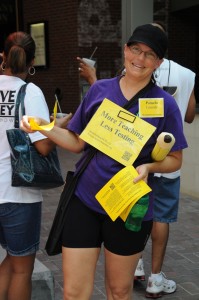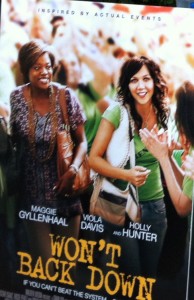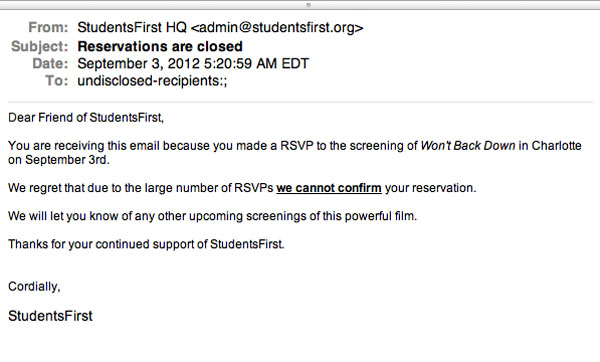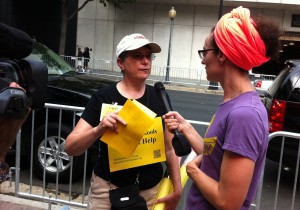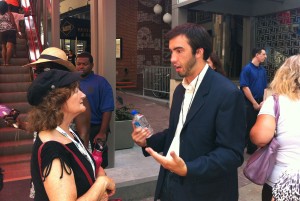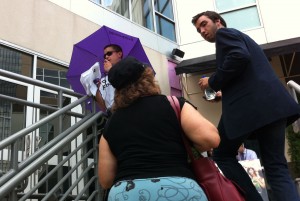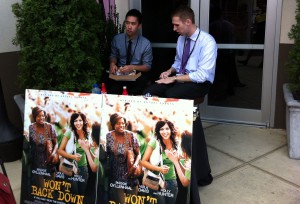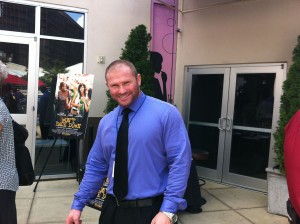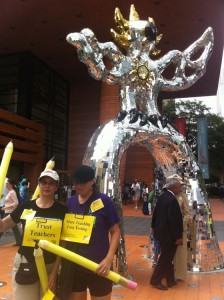 The heavies have just emerged from the third-floor movie theater where Michelle Rhee’s Students First group is showing the controversial movie Won’t Back Down. One stands imposingly tall, with big shoulders swelling his dark red shirt. The other is shorter, stockier, clad in bright blue. Both wear black ties. The man in blue seems to be in charge.
The heavies have just emerged from the third-floor movie theater where Michelle Rhee’s Students First group is showing the controversial movie Won’t Back Down. One stands imposingly tall, with big shoulders swelling his dark red shirt. The other is shorter, stockier, clad in bright blue. Both wear black ties. The man in blue seems to be in charge.
“You have to leave,” he tells us.
This is an awkward moment. Admittedly we’re carrying giant yellow pencils made from pool noodles, and wearing signs – “More Teaching, Less Testing,” “Closing Schools Doesn’t Help” – that don’t exactly mesh with the Students First agenda.
But it’s not like we’ve barged in and tried to crash their party. A Students First representative has personally invited us upstairs, after we started pointing out to members of the media that his organization was being quite selective about who they were allowing into their event. But he’s disappeared behind the theater doors, leaving us stranded.
What to do?
* * *
We had tried to do it by the book. A few weeks ago, when Students First announced that they would be bringing Won’t Back Down to the Democratic National Convention here in Charlotte, they posted a Web page where people could sign up for tickets. We gave them our names and e-mails right away.
We were eager to see the movie, which had been generating a lot of controversy. Although it claimed to be “inspired by actual events,” the story didn’t resonate with any “actual events” we knew about. The plot line involved two moms using a law often known as a “parent trigger” to take over their children’s struggling school and turn it into a successful charter. But although “parent trigger” laws were on the books in several states, efforts to use them had deeply divided communities, and none had actually improved a school.
Now a movie is a movie. From what people had told us, Won’t Back Down was just that – a classic Hollywood fantasy, complete with heroes and villains, a bit of romance, and a happy, hopeful ending.
But Students First wasn’t just showing the movie to inspire people. It was aggressively turning this feel-good fantasy to political ends, to advocate for parent trigger legislation and charter expansion across the country – strategies that in our minds do more harm than good. We wanted to make it clear that while such strategies might shine on a movie screen, they didn’t work in real life.
So we got out the giant yellow pencils that we made when we protested ALEC education policies earlier this year. We printed signs and flyers, and settled on a staging point between an escalator and a giant sculpture of Barack Obama, executed in South Carolina sand. The idea was to talk to a few people, hand out our literature, and then go see the film and perhaps ask a couple of questions during the panel discussion that followed it.
* * *
Just before 5:21 on Monday morning, an e-mail arrives in my inbox.
Other people who signed up get the same message.
Talk about the cold shoulder. It seems pretty clear that they’re handpicking their audience.
Then again, it’s their event. We figure we’ll just stand on the sidewalk and hand out our literature. By mid-morning, signs and fliers printed, we head downtown on our bikes.
Once there, we have a fine time. Our signs draw lots of smiles and thumbs-up, especially the one that reads “More Teaching, Less Testing.” We talk to teachers and students. We meet a handful of reporters, and waste time arguing with annoying libertarians bearing mikes and cameras. We hand flyers to a few people who are headed to the movie, and to a lot who aren’t.
Although we don’t try to get into the theater, others are more determined. Former school board member Louise Woods shows up, and heads resolutely upstairs. Liz Stein, a convention delegate from Oregon, has been on the third floor for more than an hour, waiting for word on whether she’ll be allowed in.
In the end, neither Liz or Louise makes the cut. Once she makes her way back down, Liz notes that other people not on any “official” list are being allowed in. The Students First representatives seem to have no interest in explaining why they’ve kept her out. She is not a happy delegate.
A few minutes and a couple of reporters later, the guy from Students First shows up.
He’s come down to invite us to the movie, he tells her. They seem to feel bad that they wouldn’t let us in. Or they feel bad that we’re telling reporters that they wouldn’t let us in. We confer, and then decide to go.
So we head for the third floor.
Once we reach the top, things start to get strange. Apparently the memo about the moms with pencils hasn’t made it up that high, and the skeptical young men manning the doors aren’t about to let us in. Our escort argues with them briefly, looks miffed and disappears through the glass doors behind them.
Then the men in the black ties show up.
Now the movie, of course, is called Won’t Back Down. But as I noted earlier, that’s a Hollywood fantasy, and we’re all about reality. Retreat seems the sensible course of action. We head back down the stairs, shaking our heads.
We move on to the street festival on Tryon Street, where we get a lot more smiles and thumbs up. We run into some friends.
 We get our picture taken at Charlotte’s famous Firebird sculpture.
We get our picture taken at Charlotte’s famous Firebird sculpture.
We meet a reporter from Voice of America, who likes our yellow pencils. He asks me how I feel about the president. I say I like him overall, but I disagree with him on education policy. That’s why we’re out here, I continue, to try to change his mind. As this is Voice of America, I wax patriotic. That’s democracy, I say. People disagree, but they still engage each other, find ways to talk, find room for different points of view.
Except when they don’t.
Pamela Grundy and Carol Sawyer are co-chairs of Mecklenburg Area Coming Together for Schools, MecklenburgACTS.org. Pamela is also a co-founder of Parents Across America. For an independently reported account of the event, see the report broadcast by WBTV News that evening.
